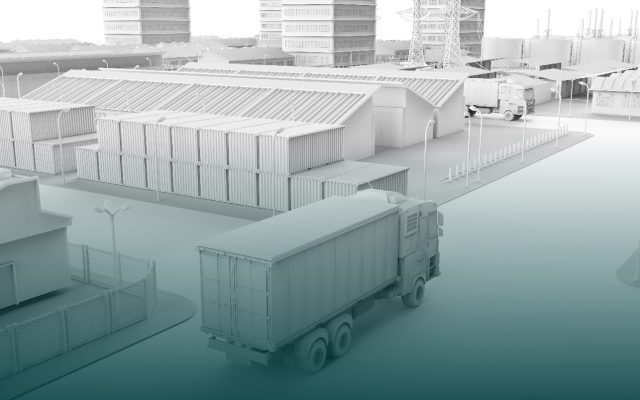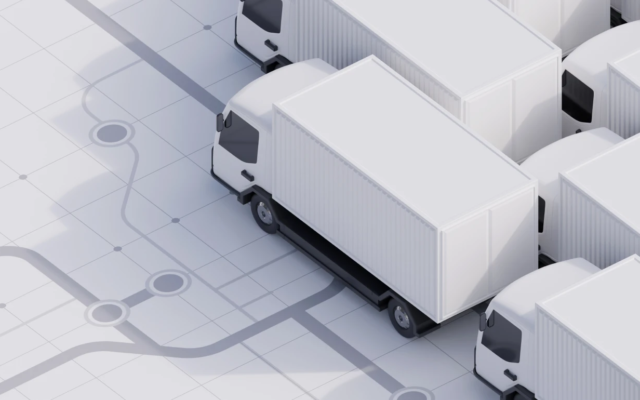Whether you’re an e-commerce business, a retailer, or just a company dealing with goods distribution, you know how challenging it is to manage logistics. Unforeseen events such as a global crisis or inflation can disrupt your supply chain. Your customers expect faster deliveries from your company. Fluctuating fuel prices lead to rising operational costs. And this is not all.
But with the emergence of logistics management systems, business owners can breathe a sigh of relief. Logistics software has automated and simplified the work of many industries. From building a resilient and efficient supply chain to optimizing route planning, technology has revolutionized logistics.
But before setting up an inventory management system and starting to look for a tech partner, you may want to learn more about what pros it can bring to the table and what challenges you can experience.
That’s why the Forbytes team is here to help. Keep reading to learn the key features and benefits of logistics management systems and the hurdles related to their integration.
What Is a Logistics Management System?
The term “logistics management system” speaks for itself – this is the system that helps in the efficient management and control of your logistics operations. It comprises software tools that optimize all processes from order placement to delivery.
To meet business demands, especially in e-commerce, companies must have a robust system in place. For instance, they need to track goods in warehouses, identify items for restocking, and handle numerous other tasks. Logistics software streamlines and speeds up these operations.
A logistics service automates many tasks and typically features a user-friendly interface. Your team can easily input records into the system to make tracking easier. From shipment and delivery to stock and failed deliveries, a logistics system offers reliable support.
Benefits of a Logistics Management System
According to the latest report, a global logistics software market size was estimated to be $20,26 in 2024 and is projected to reach $50,17 billion by 2031 with an annual growth rate of 10,6%. Such growth in market size proves that businesses are shifting from traditional logistics models to logistics management systems.
What’s more, companies that automate their supply chain get crucial advantages that help them stay ahead of the competition. Let’s see how you can benefit from a logistics solution.
Boosted operational efficiency through automation of processes
One of the key benefits of logistics software for businesses is a chance to streamline their supply chain operations. By automating processes, a logistics management system reduces manual labor and minimizes human errors. As a result, companies not only speed up operations but have more accurate workflows.
Lower operational costs through optimized resource management
Another advantage of supply chain digital transformation is that it can significantly save overhead expenses. You can better deal with inventory management and assess demand and supply by automating your operations. As a result, you can ensure you don’t buy unnecessary logistics supplies. Additionally, supply chain management can serve as an effective measure to save costs in risky situations.
Increased customer satisfaction through faster and more reliable service
With an inventory management system, you can offer faster and more reliable services, reducing the chances of late deliveries and mismanagement. As a result, your clients will become more satisfied, leading you to better ratings. This strengthens your competitive advantage and enables you to maintain top-notch service.
According to the Gartner survey, improving or updating a system is a top priority for 37% of logistics leaders, directly affecting customer satisfaction. The same research confirms that 29% of logistics leaders prioritize customer satisfaction. So, investing in logistics management software is an effective strategy for better meeting clients’ needs and enhancing their overall satisfaction.
Increased visibility and control over the entire logistics process
Without proper tools, supply chain management can be challenging. Logistics management software centralizes and streamlines your processes while ensuring better visibility. With a clear overview of all activities, you can make more informed decisions and detect errors before they become problems. As a result, you’ll gain better control over the entire logistics process, saving both time and money.
Reach out to our team today to unlock more benefits for your business with our advanced logistics management software.
Key Features of a Logistics Management System (LMS)
The structure of a logistics management system is complex. It consists of modules that work together to streamline logistics operations, boost efficiency, and ensure timely and accurate delivery of goods and services. Let’s focus on key modules and their functions.
Inventory management for tracking and optimizing inventory levels
Inventory management is vital in the supply chain as it controls and tracks the products available for sale. The functions of this module include receiving, storing, and monitoring inventory. That’s why it’s essential to provide accurate information to ensure rapid and frequent updates.
The value of an inventory management system is that it centralizes data in one place, ensuring data clarity and consistency. Plus, it tracks and reports any inventory changes, assisting in avoiding stock shortages or excess. As a result, inventory management techniques help estimate product demand and prevent ordering excess.
Warehouse management for streamlined and automated warehouse operations
Warehouse management is a module of the logistics system responsible for maintaining, controlling, and automating warehouse operations. These operations include receiving items, moving them, managing staff, ensuring safety, and using software and hardware to track items.
A warehouse management system consists of tools that streamline managing goods from arrival to storage, tracking, order management, and dispatching. As a rule, the warehouse management system performs the following operations:
- Warehouse design: Optimizing storage space and workflow by providing a manageable warehouse 3D map.
- Picking: Guiding order assemblers to the right items using barcode scanning and optimized picking routes, including batch picking.
- Packing: Ensuring orders are packed correctly and efficiently according to established standards.
- Labor management: Assigning tasks to workers, tracking productivity, and optimizing workflow to increase efficiency and lower costs.
Transportation management for route planning, fleet management, and optimization
One of the basic modules of a logistics management system is transport management. It involves using software to handle transportation needs and oversee shipping details. The core features of the transportation management system are the following:
- Delivery management and scheduling to ensure on-time delivery, automate asset tracking with AI in logistics, and send alerts for any delays.
- Cross-docking for streamlined delivery from manufacturer to customer, reduced delivery time, and saved warehouse space.
- Last-mile logistics for providing same-day and instant delivery services.
- Order tracking for monitoring shipment progress and enabling location tracking in real-time.
- Transportation accounting for gathering shipment-related documents and generating and paying invoices.
Order management for order entry, fulfillment, and tracking
The order management system is responsible for various operations such as inventory creation, customer service, payment acceptance, fraud detection, and documentation handling between parties involved in the supply chain.
Order management software centralizes orders from all sales channels and allows for monitoring them from placement to delivery. This system serves as a hub where order information, including routes, inventory status, warehouse connectivity, and integration with accounting for invoicing and payments, is displayed. Additional features of the order management system may include integration with marketplaces, vendor inventories, and multi-currency options.
Reporting and analytics for data-driven decision-making
Logistics management systems use data analysis and reporting features. As a result, they allow for tracking shipping history and enhance many operations. By using Business Intelligence, logistics software provides mechanisms for predicting supply chain issues, KPI forecasting, and performance metrics tracking.
Reporting and analytics provide better visibility of logistics processes and control over future outcomes. Reports generated by logistics software can be used for extracting meaningful insights and making data-driven decisions.
Integration capabilities for connecting with other systems
Logistics management systems have robust integration capabilities and connect seamlessly with other systems across the supply chain. As a result, these integrations make operations more efficient and smoother. Here are the key integrations and their functions:
- Warehouse management systems: Streamlining warehouse operations and ensuring accurate order fulfillment in real time.
- Transportation management: Planning routes, selecting optimal courier management software, and tracking shipments for efficient transportation logistics.
- Enterprise resource planning (ERP integration): Sharing order, inventory, and financial data for understanding business operations.
- Customer relationship management: Monitoring customer orders, preferences, and feedback for better interaction with clients.
- E-commerce platforms (e-commerce order management): Synchronizing product information, orders, and customer data to drive online sales.
Ready to optimize your logistics operations or integrate systems for seamless efficiency? Contact us to kickstart our collaboration.
Challenges of Integrating Logistics Management Systems
The integration of logistics management systems is also a challenging process that requires proper planning and staff training. So, let’s consider these hurdles to prepare you for addressing them in the future.
- Integration with existing systems. When integrating logistics management software into a company’s infrastructure, it must be compatible with existing systems. This can be tricky because different systems might use different formats and methods to handle data.
- Data security and privacy concerns. Since logistics systems handle a lot of sensitive information like customer data and inventory details, it’s crucial to keep it safe from hackers or unauthorized access. Following rules like GDPR or HIPAA is vital to avoid legal issues.
- Training and adaptation by staff. Introducing a new logistics system means teaching employees new ways of doing their jobs. This can be tough, especially for those used to older systems or manual methods. Proper training and support are necessary to help everyone adjust. Some employees might be hesitant to change, so overcoming resistance is vital for success.
Forbytes makes logistics system integration easier by ensuring compatibility with existing systems. We protect sensitive data and help businesses follow security rules. Plus, we provide training and support so employees can quickly adapt to the new system.
How to Implement a Logistics Management System
A logistics management system can make your business more efficient by automating time-consuming tasks. It comes with great features that improve results and speed up delivery times. By using the latest technology, you can simplify many processes.
Implementing a logistics management system starts with understanding your business needs. At Forbytes, we analyze your specific requirements to determine the best approach, whether building a custom solution tailored to your operations or integrating a reliable off-the-shelf system.
Our process includes:
- Needs Assessment: We evaluate your current logistics processes, challenges, and goals.
- Solution Selection: Based on the assessment, we recommend either a custom-built system or an off-the-shelf solution.
- Seamless Integration: We ensure smooth integration with your existing tools and workflows.
- Security & Compliance: We implement strong security measures and ensure compliance with regulations.
- Training & Support: We provide hands-on training and continuous support to ensure a smooth.
For a better return on investment (ROI), you may need well-designed logistics software. At Forbytes, we offer logistics software development services that help companies cut operation costs, optimize delivery time and routes, and ensure convenience for both employees and clients. We apply our tech and market expertise to build B2B and B2C logistics software solutions tailored to the challenges of the industry.
Ready to develop and integrate a logistics management system and streamline your operations? Contact us, and we will respond promptly to discuss how we can empower your business with an advanced logistics solution.












